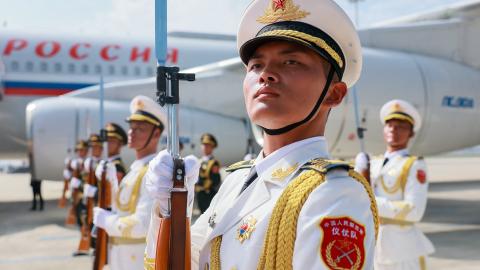As Ukraine endures the bloodshed of Russia’s brutal war of aggression, debates intensify over what a postwar settlement should look like. Ukrainian President Volodymyr Zelenskyy has made clear that international security guarantees will be essential to deter further Russian aggression and to ensure Ukraine’s survival as a sovereign, independent state. Yet, in considering which nations should form the backbone of this security architecture and spearhead Ukraine’s reconstruction, one country must be categorically excluded: the People’s Republic of China. Principle and precedent demand this.
The first and most direct reason for China’s exclusion is Mr. Zelenskyy’s assessment. After years of hesitation, Mr. Zelenskyy said two weeks ago what many in the West had long understood: China is not a neutral actor in the war but an enabler of Russian aggression and thus should not be a security guarantor after the settlement with Russia.
He explained the most obvious: “Why is China not in the guarantees? First, China did not help us stop this war from the beginning. Secondly, China helped Russia by opening the drone market.” This blunt acknowledgment followed accusations by the United States and its European allies that Beijing has supplied Russia with critical components for missiles, tanks, aircraft and other weapons. These are not the hallmarks of a peace broker or a credible security guarantor. They are the fingerprints of complicity.
China’s pretense of neutrality is belied by its actions. Just weeks before Russia’s invasion, Xi Jinping and Vladimir Putin declared a “no limits partnership.” Since then, Beijing has helped Russia keep its war machine afloat through energy trade, technology transfers and sanctions evasion. For Ukraine to entertain the notion that such a power could guarantee its security would be to invite betrayal into the very heart of a postwar order.
China also must be excluded for a deeper structural reason: The United States and its allies have borne the overwhelming costs of this war. At the same time, Beijing has positioned itself to reap dividends without sacrifice. The pattern is familiar. In Iraq and Afghanistan, America sacrificed thousands of lives, spent trillions of dollars and shouldered the burden of stabilizing broken states. Meanwhile, China opportunistically moved in afterward to claim the economic spoils.
In Iraq, Western oil companies have been largely shut out by Chinese state firms, including CNPC, Sinopec and CNOOC, that moved in aggressively. By the 2010s, China had become Iraq’s largest trading partner and the top purchaser of its crude oil. All the while, Beijing contributed nothing to security; instead, it relied on the costly stability provided by U.S. and coalition troops.
Though instability limited China’s reach in Afghanistan, Beijing pursued mining concessions and reaped strategic dividends from America’s eventual withdrawal. While U.S. soldiers fought and died in Kabul and Kandahar, China built its Belt and Road Initiative, expanded its navy, and pressed its influence in Asia and Africa, taking advantage of the geopolitical breathing room created by America’s overextension.
The lesson is unmistakable: Whenever the United States and its allies invest blood and treasure to uphold international order, China waits in the wings to scoop the benefits at little cost to itself. To allow Beijing a central role in Ukraine’s postwar reconstruction or security guarantees would be to repeat the same mistake, only this time at Europe’s doorstep.
China’s opportunism is not merely economic; it is also rooted in the deeper moral rot of the Chinese Communist Party. Beijing has openly declared, through Foreign Minister Wang Yi, that it cannot afford a Russian defeat because that would free the United States to focus on dealing with a revanchist China. This acknowledgment strips away the last veneer of neutrality. China’s support for Mr. Putin’s aggression is not an aberration but a calculated act of self-preservation for its imperial ambitions.
Beijing dresses up its complicity in propaganda, portraying itself as the victim of U.S. “containment” and urging Europe to see Washington, not Moscow or Beijing, as the true destabilizer. This is Leninist disinformation at its core, designed to split allies, invert reality and turn aggressors into supposed victims. The same regime that crushed freedom in Hong Kong, that threatens Taiwan, that militarizes the South China Sea, now dares to pose as a champion of peace in Ukraine. To invite such a power into Ukraine’s reconstruction would be to legitimize its lies and to betray the sacrifices of Ukrainians who have fought for sovereignty and independence against aggression and imperial aggrandizement.
The stakes could not be higher. Rebuilding Ukraine will not be a mere economic project; it will shape the nation’s long-term alignment and security posture. Security guarantees will determine whether Ukraine stands resilient against renewed aggression or becomes vulnerable to manipulation. Including China in this process would risk giving an adversarial power leverage over Ukraine’s future and, by extension, Europe’s security.
Mr. Zelenskyy has set the proper standard: Only nations that have supported Kyiv since the Russian invasion should be trusted with the role of guarantor. These include the United States, Britain, Poland, the Baltic states and other European allies who have stood firm, provided arms and shared in the sacrifices. China has done the opposite. It has enabled the aggressor, undercut sanctions and sought to exploit the chaos for its own advantage.
The United States and its allies must insist on a principle as straightforward as it is just: no peace dividends for aggressors’ accomplices. Ukraine’s reconstruction and security guarantees must exclude China. To do otherwise would reward duplicity, squander hard-won sacrifices and repeat the very mistakes that allowed Beijing to enrich itself from America’s wars in Iraq and Afghanistan.
Ukraine’s future cannot be entrusted to a regime that arms its enemy and seeks to undermine the free world. Reconstruction must be a project of democracies, for democracies, by democracies. China has no place in it.















